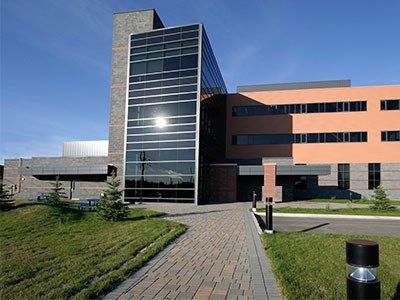Sudbury’s SNOLAB will gain some new tenants in the coming weeks, but they're not the usual physicists.
They will be analyzing something as elusive but essential as SNOLAB's neutrinos – data.
The data analysts will be using the newly announced Mining Observatory Data Control Centre (MODCC) in SNOLAB's above-ground facilities, a few hundred metres from the Creighton Mine access shaft in Sudbury.
The MODCC is a 4-year, $2,425,000 project that resulted from a partnership between the Centre for Excellence in Mining Innovation (CEMI), SNOLAB, the Canada Mining Innovation Council (CMIC) and the Northern Ontario Heritage Fund Corporation (NOHFC).
SNOLAB focuses on subatomic physics, but the new centre will be used to develop data tools for the mining and exploration industries. CEMI's vice-president Damien Duff said the collaboration will benefit both organizations.
“They (SNOLAB) want to diversify their science base, and be working more with people elsewhere within the scientific community,” said Duff. “On the one hand, they can learn from those people and how those people can help them, but also how they, as physicists, can bring their knowledge to bear on the mining industry.”
“The collaborative effort including SNOLAB and the synergies presented, are critical.”
CEMI announced the global request for proposals in February, with a deadline of March 31. Data analytics business start-ups and small-to-medium enterprises (SMEs) are invited to apply to use the space for a period of two years.
“MODCC is designed to be an incubation space where people who have ideas can turn all these data into valuable decision making tools,” said Duff. “It's a place where those people will be invited to come and test whether their idea really works.”
The space can likely accommodate two projects, but Duff said the number they accept will depend on how many on-site employees each business has. SNOLAB offers high-quality office space and administration tools that Duff hopes will encourage high-quality researchers to apply.
“Somebody coming to work at the MODCC can be one of those technical people who knows nothing about running an office or running infrastructure, and really focus on your technical work. It’s taken care of for you through MODCC,” said Duff.
To qualify, applicants have to create one new job to be located at the centre, and develop a product or service of use for the mining and exploration industries during their time there. All the commercial rights will be retained by the start-up or SME.
We want to advance the yardsticks and get quicker results than with traditional data collection,” said Duff.
Traditional data collection is described as collecting, analyzing and publishing results. Duff said they want to find a more efficient way to make that data available and implementable as a product or service for industry.
“The idea of a data centre, specifically one that would make it possible for new jobs to be created and new ideas to come to the forefront, right here in Northern Ontario would benefit the whole world,” said Duff. “We'd become a hub for this sort of activity.”




